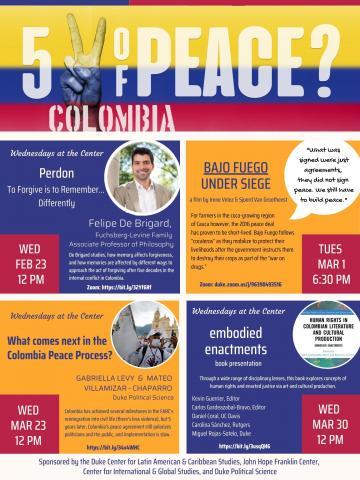
Forgiveness does not necessarily mean forgetting, says Duke philosopher and neuroscientist
How can you help someone who cannot forgive to move on?
Memory and forgiveness can both coexist, said researcher Felipe De Brigard, the Fuchsberg-Levine Family Associate Professor of Philosophy and Neuroscience at Duke University.

De Brigard spoke about his work in the U.S. and Colombia in his talk “Perdon: To Forgive is to Remember… Differently” on Wednesday, Feb. 23, as part of the series Colombia: Five Years of Peace? in collaboration with Wednesdays at the Center.
De Brigard began his project “Forgetting and Forgiving: Exploring the connections between memory and forgiving in Colombia” by studying forgiveness as a tool for emotional distancing from trauma and the perpetrators of that trauma.
“The hypothesis was to see whether forgiveness can actually impact the affective as opposed to the cognitive components of autobiographical memories of past wrongdoings,” De Brigard said.
In other words, could victims forgive without forgetting?
What if we use other kinds of strategies for emotional reappraisal, would that improve the chances of people to bring themselves to forgive the perpetrators?” he said. “And could we actually put this idea to the test in a population of victims of political violence in Colombia? That’s how the project started.”
With help from postdocs and grad students, de Brigard conducted a series of online studies of people who were asked to recall an event in which someone else had harmed them emotionally or physically in the past 10 years, and then the participants were randomly assigned to either forgive or not forgive the perpetrator.
Then the subjects were asked to complete a memory characteristics questionnaire.
In the results, the study found no difference between the groups in the physical or emotional details of the past wrongdoings, but it did find that those in the forgiveness group tended to experience the memories with less intensity and ruminated less on those events.
In a second trial, the study tried to evaluate the importance of the traumatic memory between those who forgave and did not forgive and found that victims who forgave the perpetrator tended to evaluate the wrongdoings as less central to their identity and less important to their current lives relative to those that did not forgive.
Another study found that the desire to avoid the perpetrators or take revenge on them was significantly lower in those who forgave than in those who were less than willing to forgive.
“And it is also the case that if you have forgiven, you have more feelings of benevolence toward the perpetrator relative to when you have not forgiven,” De Brigard said.
De Brigard received a grant to work with a team of researchers from Colombia and South Africa in the Montes de María region of Colombia, which is one of the most affected by violence, between the people displaced and those killed in the crossfire between the guerillas and the paramilitary fighters during the 57-year conflict in Colombia.
“In fact when I was growing up, El Carmen de Bolívar was really the heart of what is called the red zone. It was just basically impossible to think of ever going to any of these areas when I was a kid or a teenager,” he said.
His project plans to work very closely with the community there and train participants to help in the research. He hopes they can also help to identify mental health needs and strategies to cope with the past.
“One thing that is pretty clear from everything I have read is that forgiving actually is very helpful for your mental health. I think that a lot of people really bring themselves to forgive because forgiveness just brings some kind of peace to their mind,” De Brigard said.
One of the objectives of the research is to try to figure out whether one of the mechanisms critical for forgiveness is the emotional reappraisal of the memories of past wrongdoings – memory mollification, as opposed to cognitive modification.
It might be possible to use these strategies to bring about the health benefits of forgiveness, without necessarily having to forgive.
“I think that there are very good arguments for why forgiveness is not morally obligatory, that is to say, is not something that you ought to do. And in fact, I think that there are very good arguments for instances in which the offenses and the wrongdoings are unforgivable,” De Brigard said. “I think that you can live without forgiveness and move on, if you engage in other emotional reappraisal strategies.”
In the future, De Brigard would like to expand the research to study perpetrators of violence and how people that have committed wrongdoings remember their memories.
Miguel Rojas-Sotelo, adjunct professor and special events coordinator at the Center for Latin American and Caribbean Studies, said these questions are important if Colombia is to complete the process of healing a nation that goes beyond the individual in the blurring of lines – victim or not victim, perpetrator or not.
“I see society as a body – a society that also has a memory and has to forgive in order to move on,” Rojas-Sotelo said.
This event was sponsored by the John Hope Franklin Center, Center for Latin American and Caribbean Studies, and the Duke Center for International and Global Studies.